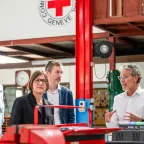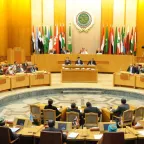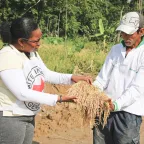Kenya, Djibouti, Tanzania: Newsletter 2023
… on those detained under the Prevention of Terrorism Act. All operational activities are …
… on those detained under the Prevention of Terrorism Act. All operational activities are …

… and when water is used for psychological terrorism, extorsion or for incentivizing …

… to be engaged in acts associated with terrorism • Health-care personnel …
In this position paper, the ICRC presents its views on cyber operations and international humanitarian law (IHL). The use of cyber operations during armed conflicts is a reality. While only a few …

In 2024, the humanitarian situation in Colombia deteriorated to its worst point in eight years, warned the International Committee of the Red Cross (ICRC) at the launch of its Humanitarian Challenges …

By knowing and referencing IHL, journalists not only enhance their reporting and foster better safety for themselves on the ground, but they also promote a better understanding of armed conflict …
… time and in any place whatsoever:] Acts of terrorism 17 Art. 4 (2) (d) of AP II See also …
… or the development of measures to counteract terrorism. •• Follow, monitor and report A … at global level (e.g. new laws on countering terrorism) are duly taken into consideration in …
… personnel guilty of committing acts of terrorism or rebellion, or of providing support for terrorism by providing health care to members … massive concentrations of population, terrorism, sabotage, vandalism, air, sea or …
The civilian population continues to bear the brunt of the war. We wish that the figures we report here for humanitarian consequences belonged to the distant past. However, these figures reflect the …

Try one of the following resources:
Created in 1863, the ICRC library, alongside the ICRC archives, provides an indispensable documentary reference on the organization itself and international humanitarian law.
International humanitarian law is based on a number of treaties, in particular the Geneva Conventions of 1949 and their Additional Protocols, and a series of other instruments.
Customary international humanitarian law consists of rules that come from "a general practice accepted as law" and that exist independent of treaty law.